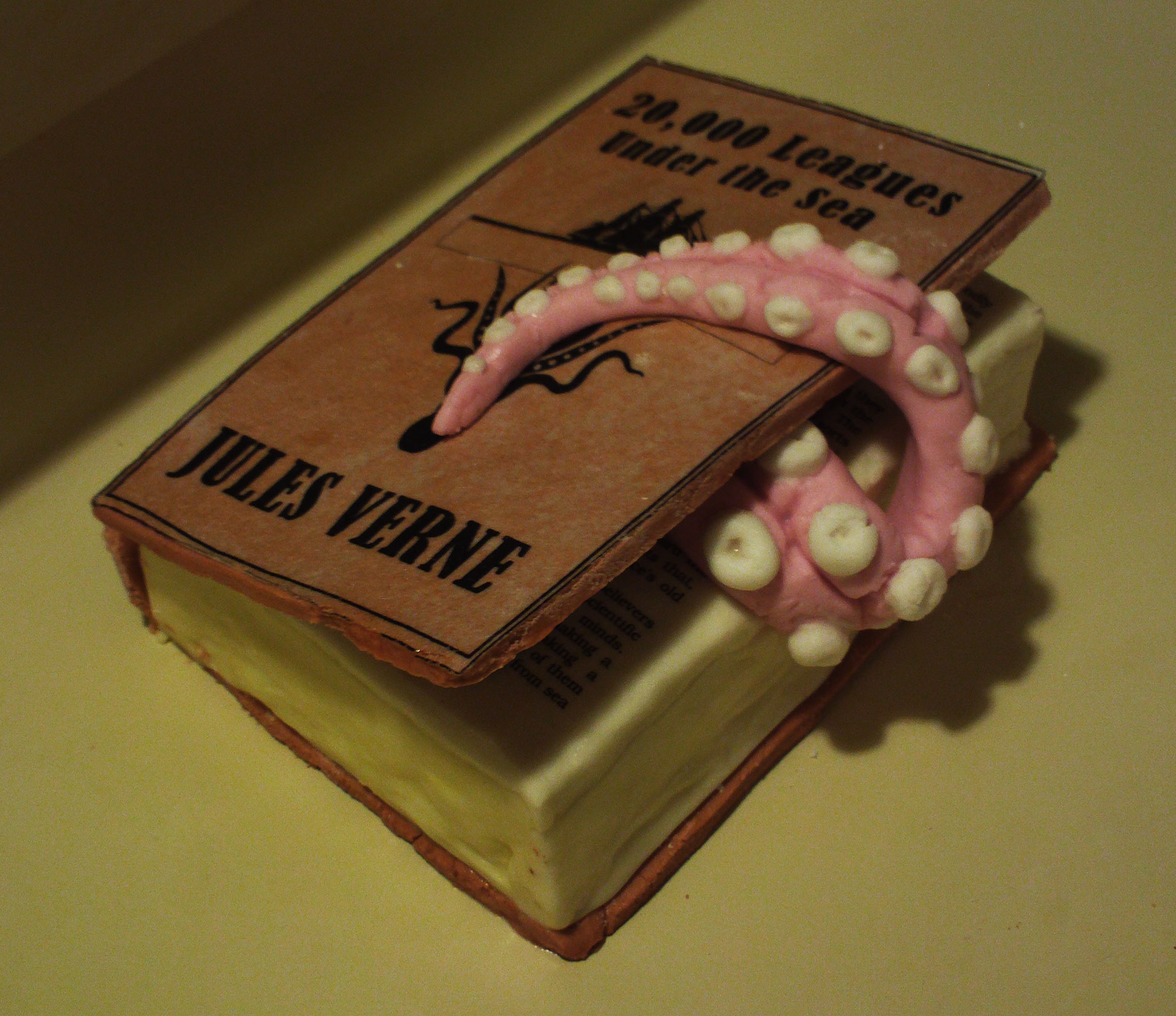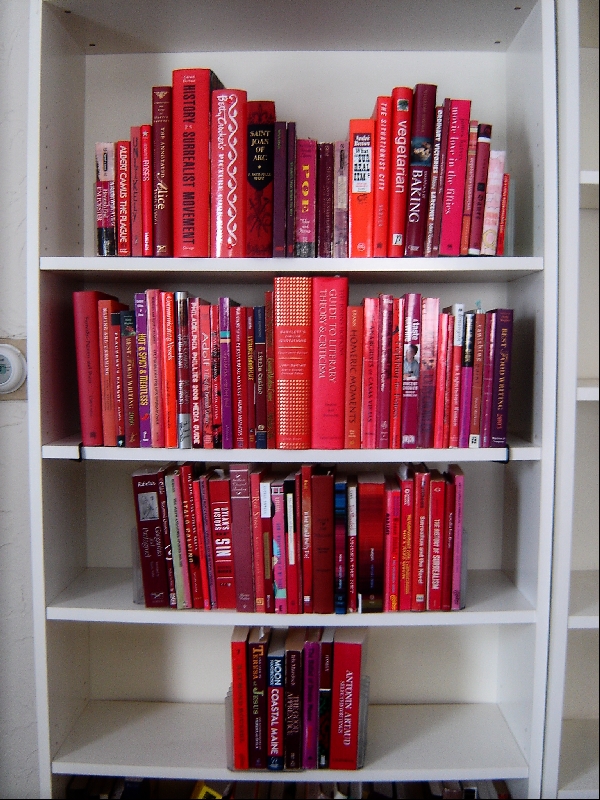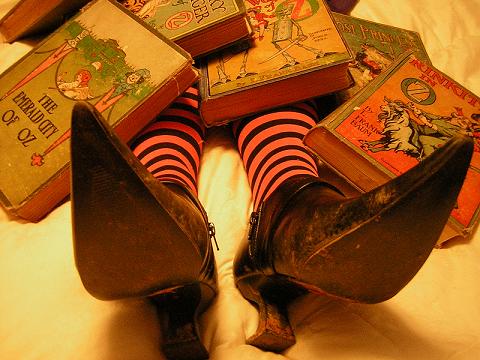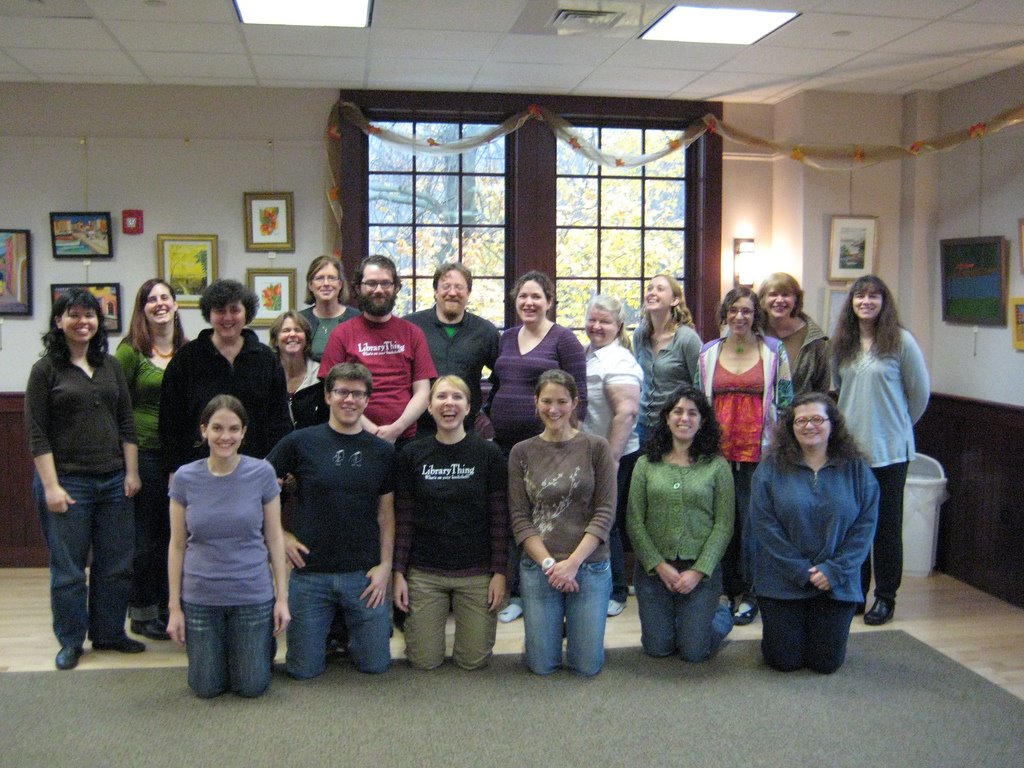On Tuesday afternoon, LibraryThing staff and members got together on the collaborative editing site PiratenPad to hash out “What makes LibraryThing LibraryThing?” for newly-arrived Goodreads members and others. This is the result. Tim took the lead, but 38 members contributed.
What we are
LibraryThing is a community brought together by the love of books.
What defines us

The name “LibraryThing” was originally a take-off on Lovecraftian lines.
LibraryThing is not one thing. LibraryThing means different things to different people. Some use it to record what they’re reading now; some catalog every book they own. Some talk on our groups all day long, others never interact with anyone. Some share everything to Facebook, others keep their library private. Some use it for book discovery and recommendations, some to help out other book lovers with their knowledge of authors, books and series. There are members for whom this blog post would be totally unfamiliar. We value what all members do with the site.
LibraryThing is about quality cataloging. LibraryThing started seven years ago as a way for regular people to have a professional-quality library catalog, and this is still the center for many members. We show this in our sources—searching over 700 libraries around the world. And we show it in how you can edit everything in your catalog. This isn’t just authors and titles, but every bit of data you could think of about a book, from the Dewey Decimal number and publication information to the book’s height and weight.
LibraryThing is book-geekery. We love the stuff of books—the details, the trivia, the connections among books and between books and other parts of life. We’ll tell you what percentage of your authors are dead, how much your books weigh, and whether a pile of them would be taller than Niagara Falls (see yours).
LibraryThing is about readers, not marketing. Our members like to read and talk about books, and of course we love to buy them too. But we think that reading and talking works best apart from commercial interests.
- Our book recommendations are never influenced by commercial considerations.
- Author and publisher spam has alienated a lot of people at other sites. We take a hard line. Authors have various official ways to promote their books, including LibraryThing Early Reviewers, Member Giveaways, and a Hobnob with Authors group. And they benefit from making sure their author page is tricked out with photos, links to their site and so forth. But other than that authors participate as readers first of all.

LibraryThing is communities. LibraryThing is a community, and LibraryThing includes many communities, especially groups like 75 Books Challenge , The Green Dragon and Folio Society Devotees. Members get together offline from time to time. And every year many members participate in SantaThing, Secret Santa for book lovers.
We have no “users.” If you’re not the customer, you’re the product. If a social website can’t support itself on customers and straightforward products, it’ll eventually sell out what you gave it—your data, your friends, and the community itself.
“No users” includes charging members. We say $10 for a yearly membership, $25 for a lifetime. In fact, you can pay as little as $1, and we often give free memberships if people ask nicely. (Until Friday ALL new members get a free membership.) But we want what paying creates—customers, with loyalty and rights—not “users”.
Members contribute. LibraryThing members have spent years of their time improving the data, helping themselves and other book lovers. They disambiguate authors and editions, add author photos, enter awards and events, organize series, police for spam and ratty data, and translate the site into more than a dozen languages. (See our helpers page.) Unlike some other sites, here all members are equal, with the power to make (or reverse) changes. And nobody can change your catalog.
LibraryThing is libraries. Public and academic libraries account for about 40% of reading, but get lost in other, commercially motivated venues. Not at LibraryThing. We love libraries—five of LibraryThing’s ten employees have library degrees and six have worked in one. Libraries give us our best data, and give us access to books no online bookseller knows about.
As part of its core mission, LibraryThing sells software and data to libraries, such as LibraryThing for Libraries. Bibliographic data is always free to libraries, including Common Knowledge and our editions data.
We’re advertising-free. Members see no ads on LibraryThing. If you’re not signed in, we show some Google ads, but they’ll vanish as soon as you create an account (free or paid).
LibraryThing is smart. LibraryThing has some of the most passionate, articulate members in the book world.
Members run rampant. LibraryThing is a company, but we tend to run it like a club, or maybe a collective. Employees listen to members and work with them. We’re going to listen and be straight with you. We’re not going to sell you out. If we do, members should take their data, take our free and copyleft data, and find a better site. Doubt us? Tell us how to earn your trust.
LibraryThing doesn’t push. We are about the books and the cataloging. If you want to share what you’re reading, great. But we’re not going to spam all your friends every time you add a book or join a group. We don’t make sharing the default just because it’s free advertising. We also don’t send out any automatic emails with updates or change our privacy policies to suit commercial interests. And we never make you automatically friends with someone on LibraryThing just because you know them on Twitter or Facebook.

Twenty-Million Books Contest.
LibraryThing is independent. LibraryThing has owners, including Tim, the founder and majority owner, and minority partners in Bowker and Abebooks. But we make our own decisions. And we’re a real company with real revenue, not a venture-capital-funded company waiting to “flip” to some dreadful new master.
LibraryThing supports the whole book world. Being independent allows us to work with everyone. We have pages and programs for authors and publishers, bookstores and libraries. “LibraryThing Local” promotes venues and upcoming bookish events around the world. Our “Get this book” includes libraries and indie bookstores at the same level as Amazon and Barnes & Noble. We also have an API for indie bookstores to include information about their current holdings.
No fine print. Our Terms of Use are written in real English, and protect members as much as anything. There are no weird trap doors—we don’t claim we own your copyright, we don’t tell you how to link to us, etc. They also include a quote from Shelley.
LibraryThing supports free speech. We provide a space for readers to say what’s on their minds, without fear of being ejected for an unpopular view. We make an exception for personal attacks: you can say what you want, but stick to ideas, not people.
LibraryThing was the original social book site. We invented the idea. We know that this and $2.50 will get us a cup of coffee, but we still feel responsible for the idea, and making it fun and rewarding, not commercial, exploitative, invasive and creepy.
LibraryThing is a work in progress. Since starting as nothing more than a basic catalog, members have guided our development to an unusual degree. Our current development priorities include:
- Better cataloging, especially Goodreads imports, ebooks and adding books, from “Add books” and elsewhere.
- Better sharing. We’ve lagged behind on sharing to social networks. We’re catching up fast.
- Better design. Members like a stripped-down, information-dense aesthetic, but, well, we really need a cleanup and refresh.
- Mobile version.
A few unique things about the site


International sites. LibraryThing is also available in more than a dozen other languages, such as German (LibraryThing.de), French (LibraryThing.fr) and even Esperanto (epo.librarything.com) and Pirate (pir.librarything.com). We also catalog from hundreds of non-English libraries, so you can add all your Italian books as easily as those in English.
Common Knowledge. Common Knowledge is our vast fielded wiki system of member-added data about books and authors, capturing everything from characters to series and awards information to related movies, dedications, author information, and much, much more. The data are available via an API, for free.
LibraryThing Local. A gateway to more than 80,000 bookstores, libraries and other bookish venues, every single one added by LibraryThing members. Mark your favorites, scope out where to visit, and browse over 65,000 upcoming events. See it at http://www.librarything.com/local. LibraryThing Local is also available on-the-go via our Readar iPhone app, or via an API for free.
Legacy Libraries. LibraryThing members have cataloged the libraries of more than 200 famous dead people, from Thomas Jefferson and C.S. Lewis to Marilyn Monroe and Tupac Shakur.
CoverGuess. We show you a cover image, you use tags to describe what you see. If your tags match up with those used by others, you get points.
Book Haiku. Summarize any book in the form of a haiku.
Dead salmon color. Need we say more?
Join us
So that’s what LibraryThing is. Does this sound fun? Join us!
You can see how we came up with this document on PiratenPad: http://librarything.piratenpad.de/ep/pad/view/449/rKERKCJPlZ (drag the slider to the beginning and press the play button to see the edits “as they happened”).
Labels: LibraryThing





I agree with everything that’s written here, but a bigger question is: is this what people want? Meaning, people who don’t use the site now but are passionate about books.
The site doesn’t have to be one thing, or take away anything it has now, but I think a key thing missing above is amazing book recommendations. LT has the data and can deliver that, but I think that recommendations should be front and center. I think that’s ultimately why people join sites like Goodreads in the first place.
Finally got a chance to read it all and it’s awesome. But being my nature, I have to quibble with “And we show it in how you can edit everything in your catalog.” There’s at least one big thing that shows up on ever Book Details page and as a potential field in your catalog that you can’t edit – Subjects. You could ponder if that means it’s “in your catalog” but it’s certainly not CK or aggregate data. It can vary depending on which source you use.
This looks great!
Welcome new members! LibraryThing is a wonderful place.
In addition to all of the above, you did not mention the free books from the Early Reviewers group. Although I joined for the cataloging and use it regularly, my favorite perk is winning so many free books, for the mere “price” of writing a review. And then I enjoy reading the other reviews. I love LibraryThing!
I’ve been a member for years and my day is not complete unless I’ve checked in on librarything! I love the early reviewer program, to date I’ve won 58 books! I’ve discovered some great authors I would never have known of because of this. And the members are nice and helpful when a question arises. Am I a fan? YES!!! I too love librarything!
I’ve been a member for, oh, five years now? And LibraryThing is my favourite website. I spend so much time here, just browsing, because it’s fun to be on. LibraryThing, I love you. 🙂
So glad you’ve put mobile back on the schedule. Now I should have no problem luring back members of my book group who slid over to GR simply because of lack of an app.
I just love LT and agree with the values expressed. Just don’t change the forum. I like the simplistic elegant look for the forum, from making new posts to reading them. Some sites update their forum boards to modern tech-savy look and I hate that. I believe what makes LT strong is it’s simplicity, elegance, easy on the eyes and quick loading times. Just keep it simple.
What brightcopy said. Splendid document but it is inaccurate: WE CAN’T EDIT SUBJECTS. I have to use the comments field to make searchable subject entries whether for picking out local content– Traditional Foods, Klallam, Salish– or to paste the whole subject entry from Worldcat into the Comments field when I can’t find a bib with subjects that I can import.
I’d love love love it if this could be fixed.
All true, and I’m a lifetime member with a couple of LT T-shirts to prove it, but as I’ve said before in forums, conversation is clunky here. If I’m having a chat about a book, I want all of it on the same page, the page about the book and I don’t want to have to jump around from friend to friend and page to page trying to remember who said what last time I logged in. I also want the option to have notifications sent to my email.
Until LT improves conversation here, to the same user-friendly standard as GoodReads, I’ll stay inactive…
I joined LT in April 2006 when it was just a baby website. When I joined, I was specifically looking for someplace to catalogue my books. I only had about 1,000 books in my personal library at that time, and am now close to pushing through the 16,000 mark. I am continually blown away by the intelligence and thoughtfulness Tim and his staff has brought to this community over the years. I have also seen the lives of LTers be deeply touched by the genuine friendship and community discovered here. Tim’s heart and vision has effectively bled into the soul of this site. Regardless of what the rest of the Internet is doing, may that never change!
I have to agree with everything good that you mentioned in your post.
I was exclusively a Library Thinger. I now live mostly over on goodreads but still keep my book list over here up to date, and check in with my one surviving group.
The main reasons I am not here as often? There is no way of marking all unread threads in the forum as read with just one button. Have to work my way through each one individually. Drives me NUTS
The other thing is lack of an application – goodreads do and I find this useful when out shopping so I can check what’s on my TBR list so I don’t double up.
Hey that’s not bad – only 2 gripes – you are obviously doing a good job.
First, LT helped me catalog my books. Then it showed me how I was buying more than I was reading — consistently. That motivated me to read more. Got married; had to weed out duplicate books; LT to the rescue.
Quirky? At times. Imperfect? Yes. But it provides a great service to me and I’m not here to quibble.
I’ve been a member at Library Thing for some time and still learned a lot from this. I hope to expand my involvement after learning about the other offerings.
Now…get busy with that mobile app for Android!
We agree with everything written about “What makes LibraryThing LibraryThing?”. We LOVE LibraryThing!!! As a small non-profit library, LibraryThing has enabled us to have an affordable, useful and easily usable catalog for our volunteer staff and our user community. Many thanks to all at LibraryThing.
What we would dearly love though is a loans application to be developed and made available for use on / from LibraryThing catalogs. We have put this proposal forward to you many times over the last few years and had various discussions here on LibraryThjing forums, but to no avail as yet. PLEASE develop a loans application!!! We feel that a loans capability would be useful to individual users as well as library users of LibraryThing.
PS: Yes, we have ourselves developed a way around loans on LibraryThing but it is fairly clunky. Essentially, we just stick to using a paper-based loans book now. Would much prefer to have our loans integrated in our LibraryThing catalog.
PS: Saraswati Library comment is from Swami Jyotimitra Saraswati of http://www.librarything.com/catalog/Saraswati_Library